DOMINIC SANDBROOK on Jacob Rees-Mogg’s failure to concede defeat

DOMINIC SANDBROOK: In his failure to concede defeat, Jacob Rees-Mogg has shown how ridiculous he is
There is no better window into somebody’s soul than how they cope with losing.
The clever teenage boy who upends the Monopoly board; the middle-aged father who hurls his tennis racquet across the court; the genteel grandmother who mutters curses under her breath after losing at bridge: none of them looks quite the same again once the fit of pique has passed.
So when, within moments of Theresa May’s victory on Wednesday, the pale features of Jacob Rees-Mogg loomed into view on the television screen, I was fascinated to see how he would react.
A gallant loser would have congratulated Mrs May on her result, pointed out that there were nevertheless 117 Tory MPs who disagreed with her and said something about sticking to his principles but working together in the national interest.
And since Mr Rees-Mogg is usually so keen on playing the courteous, old-fashioned English gentleman, that was what I expected.
But that, of course, was not what we got. Instead, his face white with disappointment, his voice icy with rage, Mr Rees-Mogg tried to claim that the Prime Minister’s 63 per cent total – more than she won when she became Tory leader in the first place – was somehow a crushing defeat.
She should, he said, phone the Queen immediately and make an appointment to resign.
As chief plotter in the failed coup to depose her, no doubt he thought he was being crushing. In fact, he looked ridiculous.
As chief plotter in the failed coup to depose Theresa May, no doubt Jacob Rees-Mogg (pictured after the announcement came on the no confidence vote on Wednesday) thought he was being crushing. In fact, he looked ridiculous, writes DOMINIC SANDBROOK
Hell yeah, I’m tough, No one messes with me! QUENTIN LETTS…
What is the backstop and why is it so toxic and what ARE…
Share this article
As viewers immediately pointed out, Mrs May’s 63-37 per cent margin was not merely greater than the 52-48 split in the EU referendum, it gave her a higher share than Mr Rees-Mogg has ever won in his North East Somerset constituency.
So if her margin offered grounds for resignation, why has he not already relinquished his seat?
And for somebody who purports to know about history, Mr Rees-Mogg’s attempt to draw a parallel between Mrs May’s result on Wednesday and Margaret Thatcher’s in 1990 – she narrowly won a confidence vote but resigned anyway – is absurd.
Mrs Thatcher was brought down by two of the biggest beasts in British politics: her former Chancellor and Foreign Secretary, Sir Geoffrey Howe, and her former Defence Secretary, Michael Heseltine.
By comparison, Mr Rees-Mogg and his European Research Group butler, Steve Baker, are a pair of dwarfish eccentrics, posing on the steps of Westminster like boys playing at being politicians.
The fact is that, contrary to his image, Mr Rees-Mogg has always struck me as a less than serious person.
I am not saying that he is stupid. Nobody who has carried off that act for so long, with such popular success, can be stupid.
And for somebody who purports to know about history, Mr Rees-Mogg’s (pictured outside Parliament yesterday) attempt to draw a parallel between Mrs May’s result on Wednesday and Margaret Thatcher’s in 1990 – she narrowly won a confidence vote but resigned anyway – is absurd, writes DOMINIC SANDBROOK
But political seriousness is not the same thing as rushing to appear on television. Nor is it the same thing as sticking rigidly to supposed principles that everybody else views as utterly unrealistic.
The truth, I think, is that Mr Rees-Mogg is a vaudeville turn who has been found out. When he launched his coup, he overplayed his hand. He knows it, and he does not like it one bit.
Like his fellow conspirator Boris Johnson, he makes an eccentric and amusing guest on panel shows such as Have I Got News For You.
But the very idea of him sitting in government, making decisions that would affect, for example, the lives of children in Northampton, pensioners in Aberdeen and young couples in Swansea, strikes me as frankly absurd.
I am well aware, of course, that many Tory activists find Mr Rees-Mogg’s music-hall act irresistible. A friend who knows the party well once claimed that if the North East Somerset MP ever made the final two in a leadership contest, he would romp to victory. Really?
Yes, Tory members always like a toff, even a slightly pantomime one like Mr Rees-Mogg.
Pictured: Theresa May speaks in Brussels on Thursday after surviving her no confidence vote
And of course it also reflects the fact that, whatever our politics, we all enjoy seeing our more strident prejudices reflected back at us in uncompromising, if articulate form.
But if I am being honest I have never been a Rees-Mogg fan. The fact is that in today’s world, any Tory leader should ideally be able to present a story of aspiration and hard work, which was always a handicap for his fellow Old Etonian David Cameron.
As is well known, Mr Rees-Mogg did not exactly work his way up from the bottom. The son of the former Times editor William Rees-Mogg, he was raised in the magnificent country house of Ston Easton, Somerset, largely by his nanny.
He began investing in the stock market at the age of ten when he was given £50 (the equivalent of about £400 today) by a cousin. I don’t know about you, but my cousins didn’t give me such sums when I was ten.
Having made a lot of money in the City in the 1990s, he went into politics, famously campaigning in Central Fife in 1997 (a seat he lost) with his nanny.
Tory activists who believe he is the answer to the party’s prayers might want to ask themselves if this is the kind of behaviour likely to impress ordinary voters in, say, Nuneaton.
What really propelled him into the limelight, though, was the EU referendum.
Ever since 2016, Mr Rees-Mogg has posed as the champion of no compromise, denouncing every pragmatic accommodation with reality, and never ceasing to snipe at Mrs May and her ministers.
Of course this perfectly fits his deliberately antediluvian persona. Whether it is in the national interest, of course, is a very different story.
Until a few weeks ago, he struck me as essentially harmless, perhaps even an eccentric adornment to our public life, deliberately striking Victorian poses and always taking the most reactionary line on every issue (remember this is a man who is so anti-abortion he claimed that women who terminate a pregnancy after rape were committing a ‘second wrong’).
But after the debacle of his initial coup against Mrs May, when he and his parliamentary manservant, Steve Baker, failed to get the 48 letters they were promised, there have been surprising flashes of anger, even nastiness, behind the polite façade.
Mr Rees-Mogg looked like a posturing, blustering blowhard – and he did not enjoy it. Nor did he enjoy it when Mrs May piled up a solid lead in the confidence vote, puncturing his hopes of succeeding her as Prime Minister.
To put it bluntly, she won and he lost. A gentleman would have congratulated her on the result and retired gracefully.
But it appears that Mr Rees-Mogg might not be such a gentleman after all.
Source: Read Full Article




